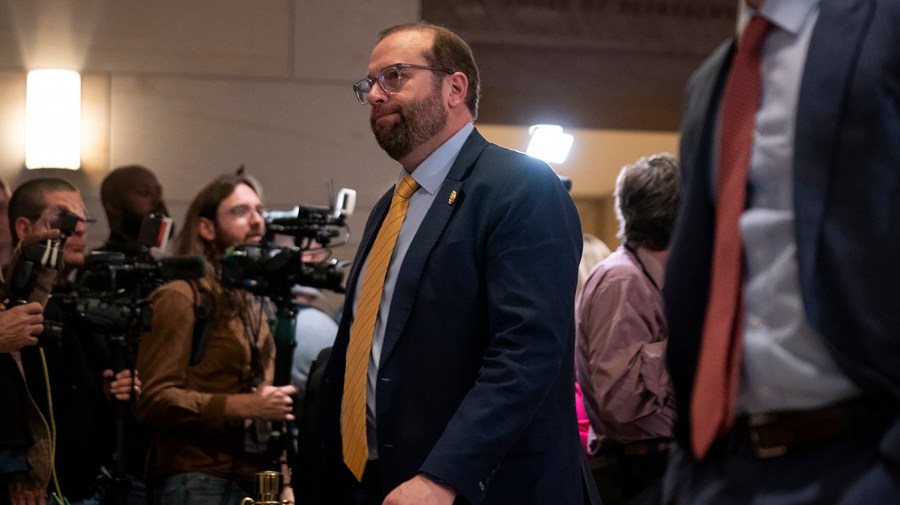
Republican tax writers boosted pressure on the rest of their party on Tuesday to pass tax cuts as their top legislative priority.
“We must make the Trump tax cuts permanent as soon as possible,” Rep. Jason Smith (R-Mo.), chair of the Ways and Means Committee, said during the committee’s first hearing of the new congress.
Republicans have been split about whether they want to move on one bill to pass their agenda, which includes tax cuts along with new border security and energy production laws, or to spin the tax cuts off into a separate bill later in the year.
Increasingly, it looks like Republicans are going to opt for one larger bill instead of breaking it up into the two bills preferred by Senate leadership, but the matter isn’t settled.
President-elect Trump has said he would like a single bill, but is open to doing two.
House tax writers drove the point home on Tuesday, saying that extending the 2017 Tax Cuts and Jobs Act, often referred to as the Trump tax cuts, needs to be a top priority.
“If Congress doesn’t act soon, family owned farms and main street businesses will have to start calling estate planners and accountants to figure out how they navigate the potential increase in taxes,” Smith said.
Passing any part of their agenda without Democratic buy-in will require a legislative workaround known as budget reconciliation, which neutralizes the threat of a Democratic filibuster in the Senate.
But reconciliation has more restrictive rules, and Republicans’ razor-thin majority in the House means that legislation passed this way will require the support of the entire conference. Any defections could spell disaster, which makes it a risky move for such a wide-ranging agenda.
Republicans have additional obstacles to surmount for their party-line bill, including figuring out where to make $2.5 trillion in spending cuts that were mandated by deficit hawks in exchange for a $1.5 trillion debt limit increase in the latest appropriations package passed in December.
They also need to figure out how they’re going to raise the debt ceiling ahead of a March 14 deadline, a measure that could alternatively be stuck in a reconciliation bill or in a funding bill.
At a meeting on taxes with Trump and Republicans focused on the state and local tax (SALT) deduction cap that was held over the weekend, participants listed several options for a debt ceiling increase, mentioning the funding bill and either of the two possible reconciliation bills that Republicans could back.
Speaker Mike Johnson (R-La.) has said he wants to lift the debt ceiling in the single party-line bill he’s aiming to pass.
Sources told The Hill that Trump is “miffed” about having to deal with the debt ceiling on top of everything else, as it could offer Democrats a leverage in negotiations.
Republicans themselves exploited a debt ceiling deadline in 2023 to extract cuts, notably in an IRS enforcement budget that was amped up by Democrats in the previous year. That showdown nearly led to a U.S. default and resulted in a downgrade of the U.S. creditworthiness by Wall Street ratings agency Fitch, citing governance concerns.
Significant portions of the Trump tax cuts expire at the end of this year, so Republicans likely can’t put them on the back burner if they don’t want to deliver a tax increase starting in 2026.
The corporate tax rate, which was slashed by the Trump tax cuts to 21 from 34 percent and is arguably the centerpiece of the 2017 law, is not set to expire.
Extending the expirations would add $4.6 trillion to the deficit over the next ten years, according to the Congressional Budget Office. But the overall effect of coming tax cuts on the national deficit could be more substantial, as Trump made numerous promises to cut individual taxes, such as on auto loans and overtime pay, while on the campaign trail.
During Tuesday’s hearing, Republicans frequently mentioned the 199A passthrough deduction, which allows businesses structured as partnerships, sole proprietorships, S-corporations and limited liability companies to deduct around 20 percent of their income.
Almost all businesses in the U.S. fall into one of these four categories.
“The overwhelming majority of businesses in the U.S. are not C-corporations subject to the corporate tax. Rather, most businesses – about 95 percent – are ‘pass-throughs,’ which have their income ‘pass through’ to their owners to be taxed under the individual income tax,” Brookings Institutions analysts Aaron Krupkin and Adam Looney wrote in a 2017 analysis.
Democrats repeatedly blasted the Trump tax cuts on Tuesday as having outsized benefits for the rich.
“We know that most of these cuts went to people at the very top,” Ways and Means ranking member Richard Neal (D-Mass.) said.
Most Americans believe that the wealthy and corporations do not pay enough in taxes.
“About six-in-ten U.S. adults say they’re bothered a lot by the feeling that some corporations (61%) and some wealthy people (60%) don’t pay their fair share,” polling agency Pew found last year.
Sixty-five percent of Americans – nearly two thirds – support raising tax rates on big businesses and corporations, Pew found.












